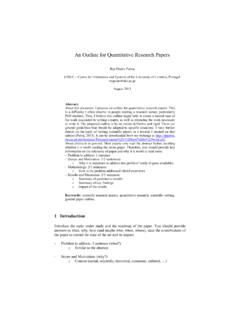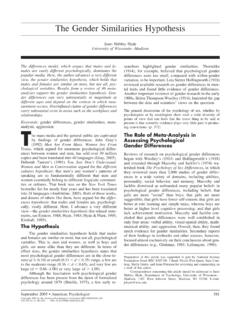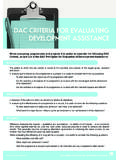Transcription of Critical Review Form – Quantitative Studies
1 1 Critical Review Form Quantitative Studies Law, M., Stewart, D., Pollock, N., Letts, L. Bosch, J., & Westmorland, M. McMaster University - Adapted Word Version Used with Permission The EB Group would like to thank Dr. Craig Scanlan, University of Medicine and Dentistry of NJ, for providing this Word version of the Quantitative Review form. Instructions: Use tab or arrow keys to move between fields, mouse or spacebar to check/uncheck boxes. CITATION Provide the full citation for this article in APA format: STUDY PURPOSE Was the purpose stated clearly?
2 Yes No Outline the purpose of the study. How does the study apply to your research question? LITERATURE Was relevant background literature reviewed? Yes No Describe the justification of the need for this study: DESIGN Randomized (RCT) cohort single case design before and after case-control cross-sectional case study Describe the study design. Was the design appropriate for the study question? ( , for knowledge level about this issue, outcomes, ethical issues, etc.): Specify any biases that may have been operating and the direction of their influence on the results: SAMPLE N = Was the sample described in detail?
3 Yes No Was sample size justified? Yes No N/A Sampling (who; characteristics; how many; how was sampling done?) If more than one group, was there similarity between the groups?: Describe ethics procedures. Was informed consent obtained?: 2 OUTCOMES Were the outcome measures reliable? Yes No Not addressed Were the outcome measures valid? Yes No Not addressed Specify the frequency of outcome measurement ( , pre, post, follow-up): Outcome areas: List measures used.
4 : INTERVENTION Intervention was described in detail? Yes No Not addressed Contamination was avoided? Yes No Not addressed N/A Cointervention was avoided? Yes No Not addressed N/A Provide a short description of the intervention (focus, who delivered it, how often, setting). Could the intervention be replicated in practice? RESULTS Results were reported in terms of statistical significance? Yes No N/A Not addressed Were the analysis method(s) appropriate? Yes No Not addressed What were the results?
5 Were they statistically significant ( , p < )? If not statistically significant, was study big enough to show an important difference if it should occur? If there were multiple outcomes, was that taken into account for the statistical analysis? 3 Clinical importance was reported? Yes No Not addressed What was the clinical importance of the results? Were differences between groups clinically meaningful? (if applicable) Drop-outs were reported? Yes No Did any participants drop out from the study?
6 Why? (Were reasons given and were drop-outs handled appropriately?) CONCLUSIONS AND IMPLICATIONS Conclusions were appropriate given study methods and results Yes No What did the study conclude? What are the implications of these results for practice? What were the main limitations or biases in the study?











